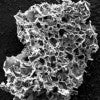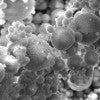
ACS taps Rice, Shell for Partners in Progress & Prosperity Award
Collaborators at Rice and Shell receive the American Chemical Society Southwest Regional Partners in Progress & Prosperity Award.

ACS taps Rice, Shell for Partners in Progress & Prosperity Award
Collaborators at Rice and Shell receive the American Chemical Society Southwest Regional Partners in Progress & Prosperity Award.

Rice lab advances water-splitting catalysts
Rice University engineers have developed a stable water-splitting catalyst for clean hydrogen generation that could potentially replace expensive iridium catalysts.

Halas, Nordlander honored in Rome
Italian President Sergio Mattarella presented Rice’s Naomi Halas and Peter Nordlander the 2022 Eni Energy Transition Award in an Oct. 3 ceremony in Rome's Quirinal Palace.

Reconstructing ice age diets reveals unraveling web of life
Rice-led research published in Science offers a clear picture of the consequences of land mammal declines on food webs.

Halas, Nordlander win prestigious Eni Energy Transition Award
Rice’s Naomi Halas and Peter Nordlander have won the prestigious 2022 Eni Energy Transition Award.

Treated plastic waste good at grabbing carbon dioxide
Rice University chemists treat waste plastic to absorb carbon dioxide from flue gas streams more efficiently than current processes.

Wind, solar could replace coal power in Texas
A fraction of the wind and solar projects already proposed in Texas could eliminate the state’s remaining coal power plants and their emissions, according to Rice University engineers.

Saudi Aramco joins Rice University’s Carbon Hub
Saudi Aramco joins Rice’s Carbon Hub research initiative to accelerate the energy transition by developing sustainable uses of hydrocarbons.
Humanities hosts daylong visit for high schoolers hoping to study the environment
These students picked Rice for a reason

Rice recognized as a Bicycle Friendly University
The League of American Bicyclists has named Rice a Bicycle Friendly University with Silver status, up from Bronze four years ago.

Gas flares tied to premature deaths
Rice engineers suggest that flaring of natural gas at oil and gas fields in the United States, primarily in North Dakota and Texas, contributed to dozens of premature deaths in 2019.

Rice earns Tree Campus USA recognition for 10th straight year
Rice earns Tree Campus USA recognition for 10th straight year

Environmental champions win Rice grants
The Rice University Sustainable Futures Fund backs six projects to help bolster the planet’s environmental health.

Rice announces plans to be carbon neutral by 2030
Rice President David Leebron and Provost Reginald DesRoches outlined the efforts in a message to the university community Feb. 11.

Rare earth elements await in waste
Rice University scientists applied their flash Joule heating process to coal fly ash and other toxic waste to safely extract rare earth elements essential to modern electronics and green technologies.